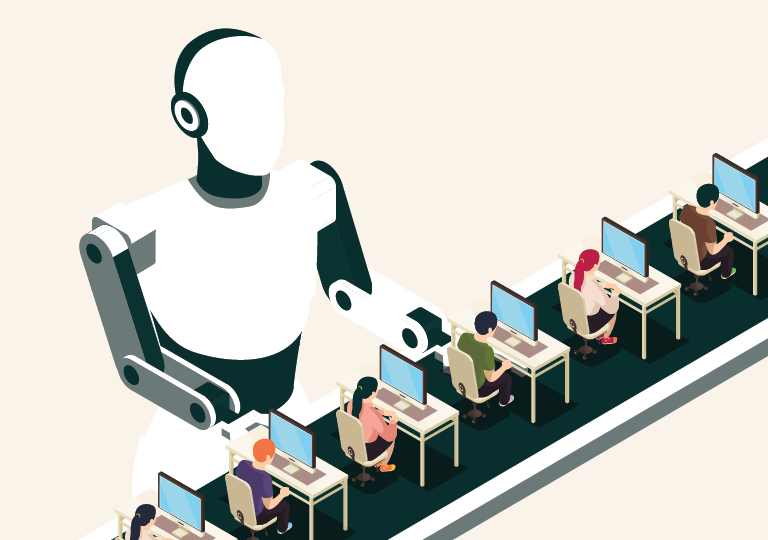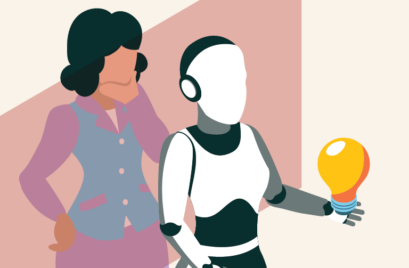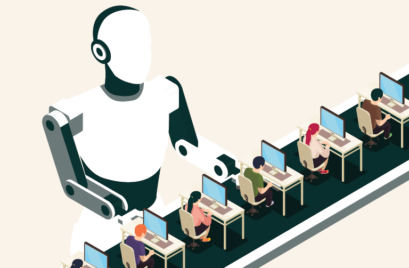
What’s at Stake for Human Autonomy, Meaning, and Connection?
Picture this
You’re in a meeting where AI has designed the agenda, selected the participants, and set the objectives. As you speak, relevant data appears on screen in real time. The system tracks your contributions: how often you speak, your tone, your influence on the discussion. After the meeting, you receive a notification: A productivity score of 45%. Not good enough!
You get one warning. Two.
Then your access card stops working. You’re locked out of the system and maybe even the job.
This scenario might sound extreme, but AI-based oversight is already happening. Gig economy workers, warehouse staff, and call centre agents are managed, measured, and sometimes dismissed by intelligent systems. Human supervisors can intervene, but increasingly they don’t. Or won’t. Or can’t.
This is called algorithmic management: AI not as an assistant, but as the boss.
AI is changing how we work. It’s replacing some jobs and collaborating with humans on others. But the real question isn’t what AI can do, it’s what kind of working world we’re creating in the process. As AI moves up the organisational hierarchy, it has the potential to reshape three core aspects of human experience at work: our autonomy, our sense of meaning, and our connection to one another.
AI’s Journey Up The Corporate Ladder
To understand this shift, think of AI as a colleague climbing the corporate ladder:
AI as the Intern
Promising but error-prone, learning fast. Early chatbots and basic writing tools that offered limited but useful support.
AI as the Junior Colleague Now reliable enough to handle routine tasks; scheduling, payroll queries, customer service, with growing competence.
AI as the Expert Peer
Trusted to provide advanced insights and analysis, making recommendations and executing complete tasks independently.
AI as the Boss
Making final decisions, tracking productivity, managing people, and running entire workflows without human oversight.
With each step up, AI takes on more authority. And as it does, something fundamental shifts in the nature of human work.
The Autonomy Question: Who’s Really in Control?
Autonomy isn’t just about freedom, it’s about having meaningful choice and control in your work. When AI plays the role of junior colleague, it can serve to enhance autonomy. But as AI starts directing work; allocating tasks, monitoring performance, automating decisions – that autonomy begins to erode.
Uber drivers experience this clearly. Routes, pricing, and job access are controlled by algorithms. While the application monitors every action of the driver, drivers have limited visibility into how the algorithm makes decisions. If a driver’s rating falls below a specific threshold, they are removed from the platform without recourse or human intervention.
Consider a recent example from the content division of a tech company. In 2023, they had a team of 60 writers and editors creating blog posts end-to-end. Then generative AI was adopted, initially to take on much of the heavy lifting in writing. But then it took over completely, researching, writing, and publishing articles, supported by one remaining human editor whose job was reduced to reviewing the machine’s output and ensure it still sounded sufficiently “human.”
As AI improves, algorithmic management will advance upward through organisations and into your daily work, conversations, and meeting rooms. With AI already tracking and analysing our meetings, it’s not hard to imagine the addition of automated prompts for participants to “stay on topic” through screen notifications or digital nudges.
Autonomy at work isn’t about chaos or freelancing; it’s about feeling trusted to make sound judgments. When every action is pre-decided by an invisible system, we risk reducing humans to compliance agents.
What happens to engagement when people have less room to think, challenge, or choose?
The Meaning Challenge: When Work Loses Its Purpose
Meaningful work drives human motivation. It gives us a sense of contribution, identity, and value.
Research shows we derive meaning from work when we experience:
- Skill Variety: Using a range of our talents
- Task Identity: Completing whole, recognisable pieces of work
- Task Significance: Doing something that matters
But as AI climbs the corporate ladder, we risk losing these drivers.
Microbiologists, once scientific detectives, now oversee, audit, and communicate automated diagnostics. Teachers, once lesson designers, increasingly facilitate AI-created content. Lawyers, once strategic thinkers, now review AI-generated case summaries.
These aren’t small changes. They represent a broader shift, which is that experts are becoming supervisors of machine output. Professionals once defined by insight, judgment, and creative problemsolving are now managing AI results. This creates a potential crisis of purpose in high-skill professions.
The Connection Gap: When Algorithms Replace Relationships
AI can be used to support human connection by helping us prepare for difficult conversations or refine ideas before sharing them. But it can also diminish connection when we substitute AI interaction for genuine human dialogue.
Consider these applications in which organisations have traded off human connection for AI-enabled convenience and efficiency:
- Work Coordination: AI-powered platforms like Notion AI, Jira Assist, or ClickUp are used to track progress and generate summaries or actions for the team, reducing the need for live check-ins or status meetings.
- Collaboration: Rather than bouncing ideas off colleagues, employees turn to generative AI tools like ChatGPT to explore creative options or solve problems.
- Professional Growth: Tools like BetterUp’s AI coach are being used for self-reflection, feedback, and coaching prompts, replacing or delaying human mentoring conversations.
It goes further. AI “delegates” are on the horizon that can attend meetings on your behalf – listening, interpreting, and responding as if they were you. Imagine preparing for weeks for a meeting with an executive leader who you see once a quarter, only to be greeted by their AI avatar. A rare opportunity for connection lost, because that leader decided to outsource their presence to a machine.
There are ripple effects on organisational culture. A 2024 study found that people managed by algorithms were 20% less likely to help their colleagues than those managed by humans. When AI becomes the boss, people tend to become more transactional, less generous, and less collaborative.
And that’s because connection isn’t an add-on to work; it’s the thread that weaves together organisational culture. When we trade connection for convenience, we risk unravelling the fabric of organisational life.
Leading the Future of Work
The future of work stands at a crossroads. But this future isn’t fixed; it’s in a state of becoming. The choices we make now determine whether AI becomes a tool for human flourishing or a force that diminishes what makes work enriching, meaningful, and relational.
The question isn’t what AI can do, so much as: What should it be allowed to do?
If we want to build workplaces where people thrive, we need to ask the following when designing our AI strategy:
- What are we optimising for? Efficiency? Cost reductions? Or something broader?
- How are core human values such as autonomy, meaning, and connection being protected and enriched through our use of AI?
- And how will we measure success in ways that account for human thriving, not just output?
The conversation isn’t about technology; it’s a human one. And it needs to be happening now – in the decisions leaders make every day – not in five years. If we want to create workplaces that enhance human experience, we must lead with intention, awareness, and responsibility.







